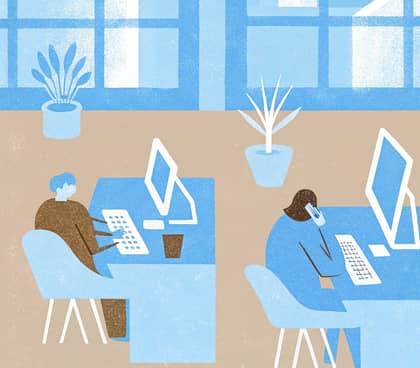With nearly two-thirds of workers now facing mandatory return-to-office policies, disruptive workplace behaviors are making an unwelcome comeback. In our latest survey of 1,000 full-time U.S. office workers, we asked them to reveal the office habits and pet peeves that have proven the most irritating since returning to in-person working.
While many of these habits might seem harmless at first glance, workers say they’re more than just annoying; they actively disrupt focus and impact productivity.
Key findings
- 1 in 8 (12.9%) of workers have only ever worked remotely and have never set foot in a physical office
- Roughly 25.6% of Gen Z workers (1 in 4) have only ever worked in a hybrid or remote position
- 93% of employees admit they are distracted by their coworkers’ behaviours in the office
- Stealing milk or food from the fridge is considered the cardinal sin of office life in 2025
- Gen Z workers are reported as the most frustrating to work with, being the generation most likely to display annoying behaviours
- Over half (59%) of respondents feel their workplace would benefit from hosting office elocution lessons
The cardinal sins of returning to the office
Whether it’s swiping a coworker’s oat milk from the office fridge or blasting videos without headphones, employees are fed up with inconsiderate behavior since returning to the office. While most workers (75.3%) said bad office etiquette is a “little distracting but manageable”, nearly 1 in 5 (17.5%) admitted it seriously disrupts their productivity.
Topping the list? Stealing food–a classic annoyance that shows no signs of going away. A staggering 97.2% of respondents said they found this behavior frustrating since returning to in-person work.
Noise complaints are also high on the list of frustrations, with 96.4% highlighting loud personal calls as mildly to incredibly irritating. Meanwhile, 95.4% admitted that noisy eating and forgetting to mute while typing or snacking during virtual meetings is driving them crazy.
Big-name companies like Amazon, Uber, and Google have embraced pet-friendly office policies to sweeten the deal of returning to in-person work. But while furry friends might boost morale, they’re not without their challenges. A striking 84.4% of full-time office workers reported run-ins with pets misbehaving on the job.
Age vs. Agitation: The office habits bugging each generation
When broken down by generation, most workers (regardless of age) agreed that loud personal calls, talking over others, stealing food and interrupting others are among the top no-nos since returning to in-person work. However, Generation Z stood out for finding vaping or smoking near office entrances especially frustrating, with 85.7% reporting this as one of the most annoying behaviours associated with the return to the office.
The office pet peeves bugging Generation Z
- #1 Loud personal calls in a shared space
- #2 Colleagues talking over others
- #3 Leaving mess in shared spaces (break rooms or office kitchens)
The office pet peeves bugging Millennials
- #1 Loud personal calls in a shared space
- #2 Stealing food from the office refrigerator
- #3 Colleagues talking over others
The office pet peeves bugging Generation X
- #1 Stealing food from the office refrigerator
- #2 Loud personal calls in a shared space
- #3 Colleagues talking over others
The office pet peeves bugging Baby Boomers
- #1 Stealing food from the office refrigerator
- #2 Loud personal calls in a shared space
- #3 Colleagues talking over others
Generation Z tops the worst office offenders list
The Zoomer Generation is the most “annoying” demographic plaguing offices nationwide, per our survey. When asked which generation was the most likely to commit almost 40 commonly complained about behaviours, Generation Z was found to be the most likely perpetrator in 17 scenarios.
Gen Z, those digital natives ages 18 to 27, are bringing new behaviours to the office that are ruffling features of their older generation workers. With 1 in 6 admitting they’ve never set foot in an office before, it’s it’s no surprise that Generation Z’s habits are raising eyebrows. From filming TikToks at their desks and venting work frustrations online to vaping near entrances and blasting music without headphones, Gen Z are rewriting the rulebook on what not to do at work.
From loud lunchtime munching to endless chatter of their latest fitness goals, millennials’ workplace habits haven’t gone unnoticed. Respondents called them out as the most likely generation to overshare personal details, eat noisily during meetings, and type with an intensity that’s too hard to ignore. Whether it’s in the breakroom or on Zoom, millennials seem to bring a certain volume to office life that disgruntles their coworkers.
59% of workers call for office etiquette lessons since returning to the office
From loud phone calls to poor meeting manners, it’s clear that some people could use a refresher on professional behavior. In fact, over half (59%) of respondents said they felt their workplace would benefit from workplace elocution lessons to smooth out day-to-day interactions.
When asked what kind of training would be most useful, Gen Z leaned into practical skills like time management, professional email etiquette, and collaborating with different personality types to avoid conflict. Boomers, meanwhile, were more interested in tackling tech-related challenges to maintain digital decorum at work.
If poor etiquette is chipping away at your focus while being back at the office, you’re not alone. As companies navigate the challenges of bringing employees back together, many workers are rethinking whether their current role is the right fit. For those considering a fresh start, having a polished, professional résumé can make all the difference in securing your next role.
Methodology
Online panel survey of 1,000 full-time American employees aged 18+ have asked to return to the office on a flexible or full-time basis.. Respondents were asked to rank a selection of 38 common office ‘pet peeves’ to determine whether they were unaffected, mildly disrupted or very disrupted by these behaviours.
Data recorded: April 2025





